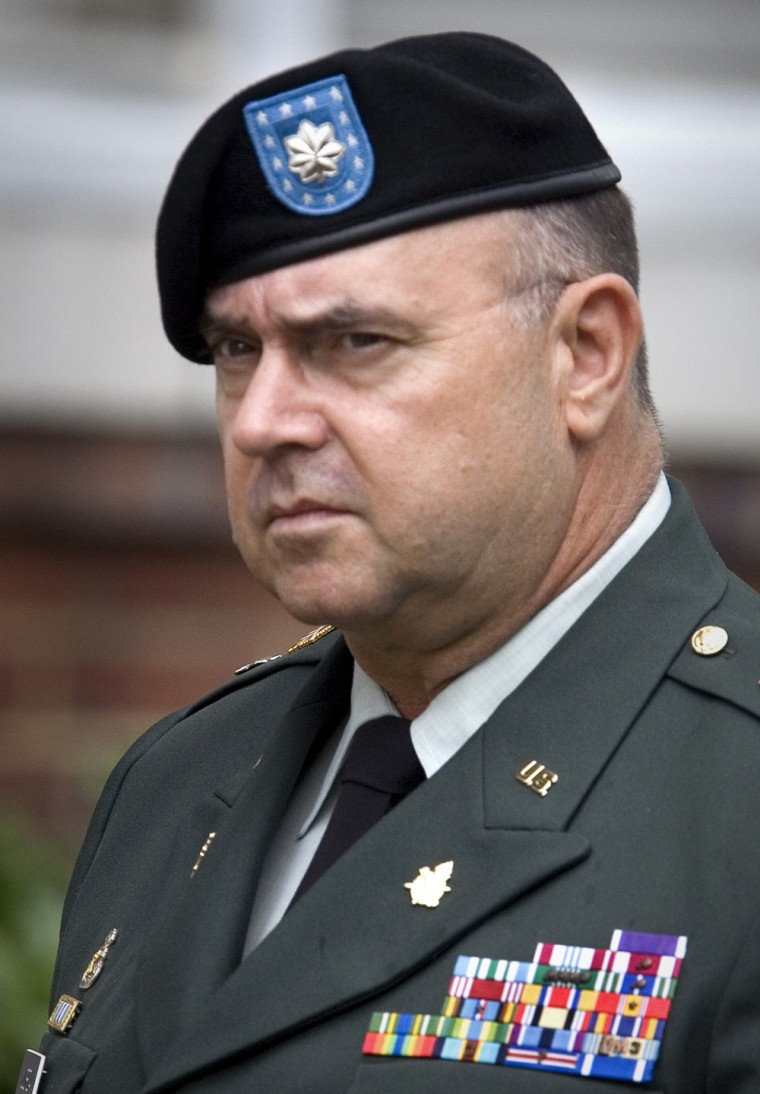A military jury recommended a reprimand Wednesday for the only officer court-martialed in the Abu Ghraib abuse scandal, sparing him any prison time for disobeying an order to keep silent about the abuse investigation.
The jury had acquitted Army Lt. Col. Steven L. Jordan a day earlier of all three charges directly related to the mistreatment of detainees at the U.S.-run prison in Iraq.
Those acquittals absolved Jordan, 51, of responsibility for the actions of 11 lower-ranking soldiers who have already been convicted for their roles at Abu Ghraib. The allegations surfaced after the release of photographs showing U.S. soldiers grinning alongside naked detainees held in humiliating positions at the prison.
Jordan was convicted of a single charge: disobeying a general’s order not to discuss the abuse investigation. The defense conceded that Jordan e-mailed a number of soldiers about the investigation after meeting with Maj. Gen. George Fay in spring 2004.
“We believe that for Col. Jordan, the vindication arises out of the ‘not guilty’ findings on the Abu Ghraib abuse charges, and we view that as very much a victory,” said Maj. Kris Poppe, his attorney. Jordan could have been sentenced to up to five years in prison, though prosecutors had recommended a reprimand and a fine of one month’s pay, about $7,400.
The reprimand was the lightest sentence the jury could have recommended. Whether it will become part of Jordan’s permanent service record is up to the court-martial convening authority, Maj. Gen. Richard J. Rowe, commander of the Military District of Washington. He will make the final sentencing decision after reviewing a written summary of the trial.
Poppe said Jordan would remain on active duty with the Intelligence and Security Command at Fort Belvoir, Va., through February, then consider retiring from a military career spanning 28 years.
Accused of fostering a climate of abuse
Jordan, a reservist from Fredericksburg, Va., never appeared in any of the inflammatory photos, but as director of the prison’s interrogation center and the highest ranking officer there at the time, he had been accused of fostering a climate conducive to abuse.
The prosecution had suggested that it wasn’t about what Jordan did at Abu Ghraib, but what he didn’t do.
The nine colonels and one brigadier general who made up the jury, however, found him not guilty of the three abuse-related charges: cruelty and maltreatment for subjecting detainees to forced nudity and intimidation by dogs; dereliction of a duty to properly train and supervise soldiers in humane interrogation rules; and failing to obey a lawful general order by ordering dogs used for interrogations without higher approval.
Those acquittals suggested that criminality went no higher than former Staff Sgt. Ivan L. Frederick, a military police reservist from Buckingham, Va., who is serving an eight-year sentence. A number of officers senior to Jordan were reprimanded administratively — but not convicted of crimes — for their roles at Abu Ghraib.
Hina Shamsi, deputy director of New York-based Human Rights First, said an “accountability gap” remains between the convicted soldiers and high-ranking military and government officials who sanctioned harsh interrogation techniques.
“None of the cases brought to date has given the systemic accounting the nation needs of what happened, why and how far up the chain of command responsibility lies,” Shamsi said. “It cries out for the kind of oversight and investigations that Congress can do.”
John Sifton, senior counterterrorism researcher with Washington-based Human Rights Watch, called Jordan’s prosecution “amateurish and half-baked” and said the military lacked the will to get to the bottom of the abuse.
Officer: I hope wounds can start to heal
Jordan told the jury during his sentencing hearing Tuesday that he took sole responsibility for his actions. He indicated that he had misunderstood Fay’s command and failed to seek clarification. The prosecution described one e-mail at trial in which Jordan asked Staff Sgt. James Beachner, an Army interrogator, if Beachner ever saw Jordan abuse detainees and whether Beachner knew of any detainee abuse by soldiers under Jordan’s control.
Jordan said he had been living and working under a cloud since the investigation began 3½ years ago.
“When I first saw photographs of the horrible abuses at Abu Ghraib, I was shocked and I was saddened,” he said. “After today, I hope the wounds of Abu Ghraib can start to heal.”
Jordan was the last of 12 defendants to go to trial. Of the 11 enlisted soldiers convicted of crimes, the longest sentence, 10 years, was given to former Cpl. Charles Graner Jr., of Uniontown, Pa., in January 2005. Lynndie England, the most recognizable face from the Abu Ghraib photos, was sentenced to three years.
